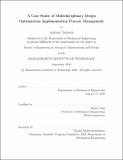A case study of multidisciplinary design optimization implementation process management
Author(s)
Yazbeck, Antoine.
Download1263359116-MIT.pdf (3.419Mb)
Other Contributors
Massachusetts Institute of Technology. Department of Mechanical Engineering.
Terms of use
Metadata
Show full item recordAbstract
Multidisciplinary Design Optimization (MDO) has been developed in the last decades in the aircraft industry with the aim of optimizing complex products while cutting costs and product development time. Despite this, MDO still has not propagated through industry to become common practice. There are several reasons for this, including the lack of educated new graduates of these topics. From an organizational and management perspective, there is often a lack of understanding on what is involved in an MDO implementation, which is a further deterrent. In complex designs, different systems from a multitude of engineering disciplines are interdependent. This stresses the importance of involving various domain experts in the design process to improve the design from diverse engineering perspectives. Involving more engineers in the design process early on raises the challenges of collaboration, known to be an important barrier to MDO implementation in industry. Another barrier is the unavailability and lack of MDO experts; those who understand the MDO process and know the implementation tasks involved both on an engineering and management prospect. In a goal to address the mentioned implementation challenges, this thesis draws an MDO framework using ANSYS software. The process for planning, implementing, evaluating and improving the workflow are described in detail. In this way, this thesis can serve as a "How-To" guide. Furthermore, an examination is conducted on the impact of varying the fidelity of models and simulations, to the final optimized designs. A real industry example of a manufactured electronics case is used throughout the thesis, however, the framework and approach is presented in general terms so that it may be applied to other commercial software platforms or solutions.
Description
Thesis: M. Eng. in Advanced Manufacturing and Design, Massachusetts Institute of Technology, Department of Mechanical Engineering, September, 2020 Cataloged from the official PDF of thesis. Includes bibliographical references (pages 77-78).
Date issued
2020Department
Massachusetts Institute of Technology. Department of Mechanical EngineeringPublisher
Massachusetts Institute of Technology
Keywords
Mechanical Engineering.